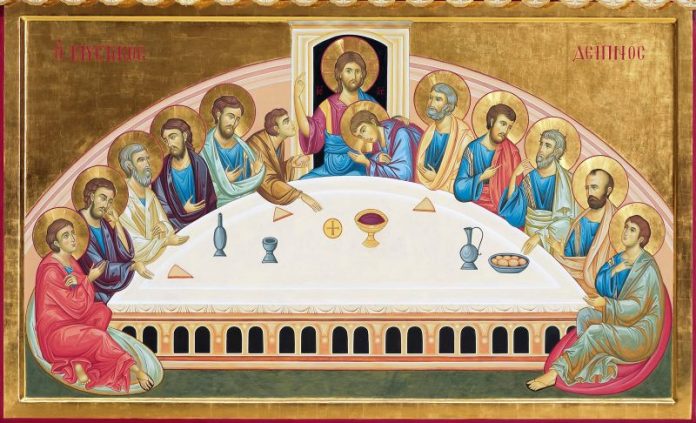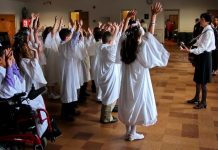
Notes on what is happening at different moments of the Mass
SR. BRITTANY HARRISON
I became a convert to Catholicism at age 14, so I never learned how to pray the Mass as a child. My later learning and eventual studying the prayers of the Mass and its spiritual movements greatly enriched my liturgical experience and worship. I offer the following guide to the Mass as a helpful and simple start to begin praying the liturgy with increased fervor and devotion.
Liturgy means “work of the people,” which implies that we have to do something instead of just passively sitting in the pews at Mass. Let’s dive into some tips for being more prepared for Mass so we can actively participate.
BEFORE MASS
Try to arrive a few minutes early to recollect yourself and calm your body and mind. Our culture seems always in a rush. If you are blessed to have a parish that allows a time of silence and recollection before Mass, try to give yourself at least five minutes to take a deep breath, settle into your seat, and thank God for this time of worship. In these moments before Mass, call to mind where you are. What intentions do you wish to offer God during this Mass? Why have you come to the altar this morning? Set your purpose.
Try to release the tension you’re carrying in your body, because in the Mass we worship God with our soul and our body (that is why we stand, sit, and kneel at certain points). Invite the Holy Spirit to guide your prayer during the Mass.
SILENCE
Silence might make us uncomfortable because it alerts us to the chaotic noise within ourselves. There should be periods of silence during the Mass. (Catechists can learn more about this by reading the General Instruction of the Roman Missal. Find it at USCCB.org.) These moments call us to still our minds and hearts to hear the Holy Spirit. As anxieties and distractions pop up, visualize offering them to Jesus, and gradually the internal storm will still.
SIGN OF THE CROSS
This moment reminds us of our Baptism and our relationship with the Holy Trinity. We are all called to bear the cross as Christians, and we mark it upon our bodies physically while renewing our desire to witness to Christ day by day.
In this moment I like to recall all of the Christians who cannot attend Mass for whatever reason, whether they are sick or homebound, suffering persecution, or imprisoned. I bring them to God at the beginning of the Mass, for the sacrifice of Jesus unites us with one another.
KYRIE ELEISON/CONFITEOR
Call to mind whatever comes between you and God as well as you and others. Offer forgiveness to the people who have hurt you. Ask God to bless them in place of the pain you’ve experienced. Ask for forgiveness and healing for the ways in which you’ve failed to live up to your Christian calling to holiness and love. Remember that God’s love does not depend upon how “good” you are, but constantly invites you to strive to be better. The Kyrie and Confiteor (“I confess …”) are as much a time of repentance as a time of rejoicing in the greatness of God’s mercy and love.
READINGS AND HOMILY
As you sit down, ask the Holy Spirit to open your heart and mind to hear the message he has for you today. Whether it be a word or phrase or a particular idea, pray for the guidance and inspiration of the Holy Spirit to help you truly hear the Word of God and faithfully carry it out. A phrase from Scripture may jump out at you, or a lyric from one of the songs, or a line from the homily; if it stays with you, ruminate on it, ponder it, and take it with you from the Mass into your everyday life.
CREED
The Creed is a summary of the most important things we believe as Catholic Christians. So
many Christians have died as martyrs for the sake of what the Creed professes. Do I, too, truly believe what the Creed states? Pray for the gift of faith and the courage to witness to it. If anything is confusing, resolve to better understand it through personal study. Ask God to give you insight into what confuses or troubles you so you can better understand what you are saying when you pray it.
PRAYER OF THE FAITHFUL
These are the prayers of the universal Church, of people all over the world. They embrace leaders, the sufferings of others, the needs of our country, and the community at prayer. What specific intentions or petitions do you want to join to the Church’s prayer during this time?
OFFERTORY
This is the preparation of the gifts of the bread and wine that will be brought to the altar on behalf of us all. Yet we should never come to Mass empty-handed. This is more than bringing our financial stewardship gifts, though support of the parish is important. Ask yourself: “What sacrifices, acts of love, gratitude, and trust can I offer to God in this moment?” Maybe a difficult situation is bringing you stress; offer it to God with trust. Perhaps your heart is singing because your children did something wonderful; offer them to God in gratitude. We all have something to bring, and it’s important to spiritually place it on the altar to be offered to God as our “sacrifice of praise” (Hebrews 13:15).
HOLY, HOLY, HOLY (Sanctus)
This prayer joins our voices with the prayer of the angels (see Revelation 4:8) as the Eucharistic Prayer gets underway.
EUCHARISTIC PRAYER
This is the priestly prayer that leads to the high point of the Mass when the bread and wine are consecrated and become the true Body and Blood of Jesus. It is a long prayer that requires reverence on our part. Some people find reading along with the prayer helps them enter it more deeply.
CONSECRATION
This is the moment when Jesus, our Lord and King, becomes truly present in the Eucharist. Although we cannot see him with bodily eyes, we can perceive him through the eyes of faith. Adore and thank him for coming. Some people like to prayerfully repeat the words of St. Thomas at the elevation: “My Lord and my God!” (John 20:28).
THE GREAT AMEN
This is connected to the ultimate moment Jesus offered his life to the Father to atone for our sins. The sacrifice is accomplished. Try to really mean your “amen,” which is the same as saying “I believe” or “It is true.
SIGN OF PEACE
In wishing peace to those around us, let us spiritually offer peace to those who have hurt or offended us, asking God to heal them and our memories of the pain they caused.
LAMB OF GOD
The Lamb of God not only recalls the biblical event of the Passover in which the lamb was slain and sacrificed for God’s chosen people before they were delivered from their bondage in Egypt (see Exodus 12:1-14), but it also notes the exclamation of John the Baptist that Jesus is the new Lamb of God who will deliver us from our sins: “Behold, the Lamb of God, who takes away the sin of the world” (John 1:29).
“LORD, I AM NOT WORTHY …”
The prayer “Lord, I am not worthy that you should enter under my roof …” is based on the words of the centurion who recognized how unworthy he was to have Jesus enter his home (see Matthew 8:8). His faith in Jesus and his humility moved Jesus to perform a great miracle and heal his servant. This is a good time to reflect on our unworthiness, but to also rejoice in God’s gratuitous and generous love and mercy.
COMMUNION
Receiving Communion is your special time with Jesus. Don’t pretend to be anything other than who you are in that moment. (Even if you do not receive Communion, it is an opportunity to speak to him heart-to-heart and make a spiritual Communion, simply expressing a desire to be with him). During this time his Sacred Heart is entirely open to us. What troubles, joys, and requests do you bring to Jesus? Do not forget to spend some time thanking him for all he does. If you’re going to Mass in another language, speak to him in your native dialect, in your own way, naturally.
FINAL BLESSING
This blessing is meant to give us the strength to go out, witness to Jesus by our lives, and grow in holiness. Do you receive it with awareness? Try to really listen to the closing prayer and the words of the blessing the next time you’re at Mass. You may find it really touches you in a new way.
This guide only scratches the surface of the spiritual riches found in the Mass. As you begin to enter into the different movements of the liturgy — from the opening call to prayer and repentance, to receptivity to the Word of God, to offering God our gifts and receiving him in return — you’ll find that the Mass takes on a new depth of meaning and beauty.
Spiritual reading is an important part of forming our spiritual lives and can help us deepen our appreciation of the truths of our faith. St. Jerome once said, “When we pray, we speak to God; but when we read, God speaks to us.”
Please see the recommended resources below. Any one of them will enrich your ability to pray the Mass with greater awareness and love.
Resources
■ The Mass by Bishop Robert Barron (DVD, Ignatius Press) — Bishop Barron walks us through the entire Mass with the history and deeper meaning of each part. It’s a great way to visually refresh and enrich our understanding of it.
■ The Mass and the Saints by Fr. Thomas Crean, OP (Ignatius Press) — Combining the writings of the saints and Church Fathers with more contemporary reflections, this text guides the reader to have an understanding of the development of the Sacred Liturgy and appreciation for its role in our spiritual lives.
■ If Your Mind Wanders at Mass by Thomas Howards (Ignatius Press) — A perfect text for those who battle distractions and boredom at Mass!
■ The Power of Daily Mass: How Frequent Participation in the Eucharist Can Transform Your Life by Bert Ghezzi (Ave Maria Press) — Contemporary testimonies, the witness of the saints, and the author’s own experience combine to offer a credible and convincing argument for the value of daily Mass attendance. Even if you cannot go to Mass every day because of work or other responsibilities, it will help you to have a deeper appreciation for the gift of the Mass.
■ The Wonders of the Mass by Fr. Paul O’Sullivan, OP (TAN Books) — A small booklet, but packed with inspirational stories about how the Mass can transform our lives; it can be read in less than an hour.
■ A Devotional Journey into the Mass: How Mass Can Become a Time of Grace, Nourishment, and Devotion by Christopher Carstens (Sophia Institute Press) — A very approachable text empowering readers to pray the Mass.
■ Eucharist (Threshold Bible Study) by Stephen J. Binz (Twenty-Third Publications) — Explore the biblical background of the Eucharist through the Old and New Testaments. Discover that the Eucharist unites the prayers, works, joys, and sufferings of our lives
as an offering in union with Christ
Sr. Brittany Harrison, FMA, is a Salesian Sister of St. John Bosco, youth minister, and social media maven. A high school theology teacher for almost 10 years and a catechist for 20, she makes the faith accessible without stripping it of its depth and beauty. Follow her on Instagram and Twitter @SisterB24.
Read more articles about catechesis at home during a crisis.
This article was originally published in Catechist magazine, November 2019
PHOTO: PAOLOGAETANO/ISTOCK




